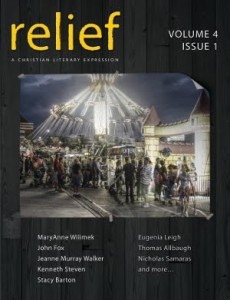 In Relief‘s current issue (V4 I1), Christopher Fisher debuts his first issue as editor by taking on where Relief – a journal of Christian literary expression – “fits in the scheme of contemporary publishing.” And, he writes, “I think of singing and razor wire.” Fisher discusses what Christian publishing has become, and how he recognizes the purely business aspect of the demarcation of what is Christian publishing, but also the perils of such segregation, the “ghettoization of religion.” His editorial, available in full online, is an insightful and provacative commentary on the subject matter. If you’ve been dismissive of “Christian” or religious lit mags in this past, this may well get you to reconsider.
In Relief‘s current issue (V4 I1), Christopher Fisher debuts his first issue as editor by taking on where Relief – a journal of Christian literary expression – “fits in the scheme of contemporary publishing.” And, he writes, “I think of singing and razor wire.” Fisher discusses what Christian publishing has become, and how he recognizes the purely business aspect of the demarcation of what is Christian publishing, but also the perils of such segregation, the “ghettoization of religion.” His editorial, available in full online, is an insightful and provacative commentary on the subject matter. If you’ve been dismissive of “Christian” or religious lit mags in this past, this may well get you to reconsider.
Two Years of The Write Place at the Write Time
Celebrating its second year of publication, The Write Place At the Write Time is an online literary publication which features fiction, poetry, “Our Stories” – non-fiction, a Writers’ Craft Box of writing essays and resources from professionals in the field, an Exploration of Theme page, Archives of past issues, A Writers’ Contest, fine artwork from artists whose backgrounds include having done work for The New York Times,
Editor-in-Chief Nicole M. Bouchard writes: “Our two-year anniversary issue is up and we encourage new and seasoned writers to send in submissions for the next issue, benefit from resources we provide, read the current issue and enjoy themselves. It’s a supportive writers’ environment dedicated to artistic expression, learning and living the written word. We are a quarterly publication and our writers range from previously unpublished to having written for The New York Times, Newsweek, HBO and Business Week, and they come from all over the US and Europe.”
New Lit on the Block :: Sliver of Stone
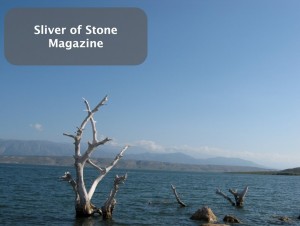 Under the guidance of Founding Editor M.J. Fievre, Sliver of Stone is a bi-annual, online literary magazine dedicated to the publication of work from both emerging and established poets, writers, and visual artists from all parts of the globe. Other hands on deck for Sliver of Stone, “the talented progeny of the Creative Writing Program at Florida International University in Miami, Florida” include: Corey Ginsberg,nonfiction editor; Fabienne S. Josaphat, fiction editor; Marina Pruna, Laura Richardson, Patricia Warman, poetry editors; Holly Mayes, art editor; and Abigail Sedaris, webmaster.
Under the guidance of Founding Editor M.J. Fievre, Sliver of Stone is a bi-annual, online literary magazine dedicated to the publication of work from both emerging and established poets, writers, and visual artists from all parts of the globe. Other hands on deck for Sliver of Stone, “the talented progeny of the Creative Writing Program at Florida International University in Miami, Florida” include: Corey Ginsberg,nonfiction editor; Fabienne S. Josaphat, fiction editor; Marina Pruna, Laura Richardson, Patricia Warman, poetry editors; Holly Mayes, art editor; and Abigail Sedaris, webmaster.
Issue One contributors include: Alan Britt, Alex Alderete, Andrea Askowitz, Andrew Abbott, Changming Yuan, Chloe Nimue Clark, Denise Duhamel , Ernest Williamson III, Gabriela Suarez, Jennifer Hearn, Jessica Barrog, Joe Clifford, John Dufresne, John Riley, John Solensten, Jon Page, Jonathan P. Escoffery, Julia Meylor Simpson, Kim Barnes, Laura Merleau, Mary Christine Delea, Nicholas Garnett, Peter Borrebach, Rae Spencer, Robert E. Wood, Roxanne Hoffman, Russ Hicks, Russell Reece, Samantha Knapp, Sherry O’Keefe , T.J. Beitelman, Terry Sanville, Tim Curtis, Whitney Scott, and Yia Lee.
Sliver of Stone accepts fiction, creative nonfiction, essays (3,500 words or less); poetry, any form or genre (No more than 5 poems); and visual art. The deadline for the next issue is October 31.
Prism Queer Comics Grant
Every year, Prism awards a significant Queer Press Grant to assist in the publication and promotion of LGBT comics. The grant is funded by donors who are either creators who want to help others just starting out, or fans who want to see more LGBT creators get published. The grant of approximately $2,000 will be awarded to an LGBT cartoonist who is self-publishing a comic book with queer characters and/or themes. Entries are judged first and foremost by artistic merit, followed by concerns such as financial need, proposal presentation, and contribution to the LGBT community. Deadline September 15, 2010.
Happy Birthday Old Dutch Church
The Old Dutch Church from Washington Irvings’s The Legend of Sleepy Hollow is 325 years old and ready for iPad tours.
Sycamore Review Online Submissions
Beginning with its new reading period beginning August 1, Sycamore Review will be accepting submissions of poetry, fiction, and personal essays through their online submissions manager. They will no longer accept submissions via traditional post after August 1, 2010. Submissions for their 2010 Wabash Prize in Poetry judged by Jane Hirshfield, however, will continue to be accepted via traditional post.
Kafka-something-or-other
“Lost Kafka writings have resurfaced, but the legal bureaucracy (legendarily immune to irony) is preventing their publication. There really ought to be some word for things like this.” Gerry Canavan
Stunning Covers :: Main Street Rag
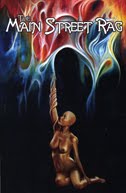 Evolution by Kathy Blackwell
Evolution by Kathy Blackwell
Books :: Teaching Poetry
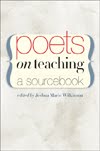 Poets on Teaching: “In response to a lack of source works for wide-ranging approaches to teaching poetry, award-winning poet Joshua Marie Wilkinson has gathered ninety-nine micro-essays for poets, critics, and scholars who teach and for students who wish to learn about the many ways poets think about how a poem comes alive from within—and beyond—a classroom. Not narrowly concerned with how to read poetry or how to write poetry, by virtue of their central concern with teaching poetry, the essays in this fresh and innovative volume address both reading and writing and give teachers and students useful tools for the classroom and beyond.” [University of Iowa Press / 1-58729-904-6 or 978-1-58729-904-9]
Poets on Teaching: “In response to a lack of source works for wide-ranging approaches to teaching poetry, award-winning poet Joshua Marie Wilkinson has gathered ninety-nine micro-essays for poets, critics, and scholars who teach and for students who wish to learn about the many ways poets think about how a poem comes alive from within—and beyond—a classroom. Not narrowly concerned with how to read poetry or how to write poetry, by virtue of their central concern with teaching poetry, the essays in this fresh and innovative volume address both reading and writing and give teachers and students useful tools for the classroom and beyond.” [University of Iowa Press / 1-58729-904-6 or 978-1-58729-904-9]
Novel Excerpt :: Leora Skolkin-Smith
In “The Fragile Mistress,” it’s the summer of 1963 on the Israeli-Jordanian border. A fourteen-year-old American girl is believed to be to be dead, killed by a sniper. The Fragile Mistress is a unpublished excerpt from the novel, Edges, by Leora Skolkin-Smith. The novel, originally published by Grace Paley in 2005, has since been re-titled and expanded for the feature film, The Fragile Mistress, currently in pre-production with Triboro Pictures. It will be shot on location in Jerusalem, Jordan, and New York, and directed by Michael Gunther. Read the excerpt in the latest issue of Guernica, online.
The Un-Mississippi Review
What the heck is going on at Mississippi Review? Anna Leigh Clark does a nice job of summing it all up on her blog, Isak: Barthelme Departs, Mississippi Review and Center for Writers in Confusion. As for Barthelme, he and several of his fellow publication staffers carry on at Rick Magazine – which will continue to link to the Mississippi Review Online archives from their site.
Work for Guernica
Guernica, an online magazine of arts and politics, has several different opportunities available: Special Events Coordinator, Accountant, Blog Intern, Publishing Intern, Editorial Interns.
On Blurbology
“So when publishing people look at the lineup of testimonials on the back of a new hardcover, they don’t see hints as to what the book they’re holding might be like. Instead, they see evidence of who the author knows, the influence of his or her agent, and which MFA program in creative writing he or she attended. In other words, blurbs are a product of all the stuff people claim to hate about publishing: its cliquishness and insularity . . . It stands to reason that, if many blurbs are bestowed for extraliterary reasons like friendship or professional collegiality, then many of them are insincere.” Laura Miller, Beware of Blurbs, Salon.com
Audio :: Les & Bi Women’s Erotic Fiction
Newly added to the NewPages Guide to Podcasts, Video, Audio: The BlogTalkRadio program Readings in Les and Bi Women’s Erotic Fiction hosted Lara Zielinsky, a bisexual author of mature adult content lesbian and bi-women’s fiction, romance and erotica. Every other week she shares excerpts and interviews with authors and others involved in the writing and publication of lesbian and bisexual women’s fiction.
Check out the NewPages Guide to Podcasts, Video, Audio for this and many other great literary resources. Know of a one we should consider listing? Drop me a line: denisehill[at]newpages[dot]com
A Word a Day
Founded in 1994 by Anu Garg, while a graduate student in computer science, A.Word.A.Day (AWAD) is a daily electronic publication from the wordserver at Wordsmith.Org. AWAD includes a vocabulary word, its definition, pronunciation information with audio clip, etymology, usage example, quotation, and other interesting tidbits about words to subscribers every day. You can think of it as a word trek where we explore strange new words. Words are usually selected around a theme every week. At last check, more than 900,000 people in at least 200 countries receive AWAD daily. There is no charge to sign up for AWAD.
Glimmer Train Short Story Award for New Writers :: August 2010
Glimmer Train has just chosen the winning stories for their Short Story Award for New Writers. This competition is held quarterly and is open to all writers whose fiction has not appeared in a print publication with a circulation greater than 5000. The next Short Story Award competition will take place in August. Glimmer Train’s monthly submission calendar may be viewed here.
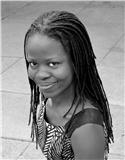 First place: Olufunke Grace Bankole, of El Cerrito, CA, wins $1200 for “26 Bones.” Her story will be published in the Fall 2011 issue of Glimmer Train Stories. [Photo credit: Cheryl Mazak.]
First place: Olufunke Grace Bankole, of El Cerrito, CA, wins $1200 for “26 Bones.” Her story will be published in the Fall 2011 issue of Glimmer Train Stories. [Photo credit: Cheryl Mazak.]
Second place: Joseph Vastano, of Austin, TX, wins $500 for “Entirely Different Places.”
Third place: Natalia Cortes Chaffin of Las Vegas, NV, wins $300 for “The Pig Roast.”
A PDF of the Top 25 winners can be found here.
Why Teach Multicultural Literature?
Multicultural Literature: Literature Changes Lives by Dr. Darrel Hoagland, a former elementary and middle school teacher who lives in New Bedford, MA and Philadelphia, PA. (from the Changing Lives Through Literature blog)
2010 New Millennium Contest Winners
New Millennium Writings has announced the winners of their 2010 poetry, fiction, short-short fiction and nonfiction contest as:
Pamela Uschuk of Bayfield, Co, has captured the $1,000 Poetry Award for her poem, “Shostakovich: Five Pieces.”
BK Loren of Lafayette, Co, took the $1,000 Fiction Prize for her story “Cerberus Sleeps.”
Norma Shainin of Mt. Vernon, Washington, was awarded the $1,000 Short-Short Fiction Prize for her story “The Famous Writer.”
Amy Andrews of Rochester, NY, earned the $1,000 Nonfiction Prize with her creative nonfiction essay, “hide and seek.”
Their works are scheduled to appear in the next issue of NMW, due out this winter, and also at www.newmillenniumwritings.com.
Books :: Writing and Publishing
 Carol Smallwood has been quietly creating a name for herself over the years, and I say quietly for a couple of reasons. First, she’s a librarian! With both an MLS and an MA, she has focused her writing on resources for librarians. But I also say quietly because she has edited a couple of phenom publications, taking the back seat to the subject matter, as great editors do. Her latest collection is one not to be missed by any writer who is interested in learning more about publishing venues. That’s right: I said Writer. Not just Librarians.
Carol Smallwood has been quietly creating a name for herself over the years, and I say quietly for a couple of reasons. First, she’s a librarian! With both an MLS and an MA, she has focused her writing on resources for librarians. But I also say quietly because she has edited a couple of phenom publications, taking the back seat to the subject matter, as great editors do. Her latest collection is one not to be missed by any writer who is interested in learning more about publishing venues. That’s right: I said Writer. Not just Librarians.
The book is Writing and Publishing: The Librarian’s Handbook (ALA Editions 2010), but any non-librarian writer who passes this book by because of that subtitle is making a huge mistake. This book is chock full of some of the most practical, hands-on, I’ve-lived-this advice from writers about the most wide array of publishing venues I have ever read in a single collection. There are 46 contributors to this collection, condensed into less than 200 pages. This is my kind of “guide” – it gets directly to the nitty-gritty of each individual topic in 92 (yes, you read me right) essays.
Granted, some of the topics covered are Librarian-specific, such as “MLS, MFA: The Working Librarian Pursuing a Degree in Creative Writing” (Colleen S. Harris), “Partners: Helping Your Hometown Paper Promote the Local Library” (Beth Nieman), and “Children’s Librarians! Use Your Skills to Fill Your Collection Gaps” (Margaret Read MacDonald). Although, I did find the information insightful and even helpful as someone who works closely with librarians to help promote events, build collections, etc. But there are plenty more contributions that seem library-specific, like “Blogging: Writing Op-Eds” (Michale Dudley) and “The Poet-Librarian: Writing and Submitting Your Work” (Colleen S. Harris) that make consideration for the role/career of librarian, but could just as easily be applicable to anyone with any other career. Specifically for librarians, however, is insight in how to participate in these publishing venues either as part of the job to help promote the library/collections, or as a separate activity and the politics of keeping your writing life clear from that of public or institutional jobs and the overreaching restrictions those sometimes have.
The breadth of topics in this collection is most astounding. It’s not just a something-for-everyone collection, it’s an a-lot-for-anyone collection. For librarians who want to do ANY kind of writing, this book is a no-brainer to get, read, and keep in your personal resource library. For others – anyone interested in writing to publish, this is a resource to take a look at. There are plenty of other “publishing” resources out there – but in my recent research for a college-level course in professional writing, finding a book as comprehensive in voices and topics as this one is RARE. I wouldn’t pass up using this as a resource with students interested in publishing. For students? Heck, for anyone trying to step into and make sense of where to get started or different directions to take in publishing.
Here’s just an outline of the content:
Part 1 – Why Write
Part 2 – Education of a Writer
Getting Started
Writing with Others
Revise, Revise, Revise
Lessons From Publishing
Part 3 – Finding Your Niche in Print
Books
Newsletters and Newspapers
Reviewing
Magazines and Professional Journals
Essays
Textbook Writing
Children’s Literature
Writing on Specific Subjects
Part 4 Finding Your Niche Online
Part 5 Maximizing Opportunities
For a more detailed outline of content, visit the publisher’s website: Writing and Publishing
Telling the Story Behind Storytelling Totem Poles
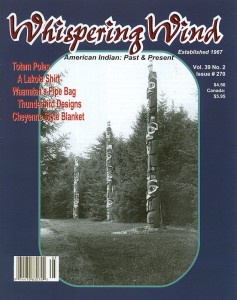 The current issue of Whispering Wind (V39 N2 I271) features the article “Totems at Sitka National Historical Park Sitka, Alaska” by Scott Jensen that is worth seeking out to read and share with others. This is a thorough exploration of the history of the totem pole in the Northwest Territory, and includes numerous, clearly referenced photos. Jensen’s writing is well researched and documented and provides a solid historical understanding of the role of the totem pole in Native American storytelling.
The current issue of Whispering Wind (V39 N2 I271) features the article “Totems at Sitka National Historical Park Sitka, Alaska” by Scott Jensen that is worth seeking out to read and share with others. This is a thorough exploration of the history of the totem pole in the Northwest Territory, and includes numerous, clearly referenced photos. Jensen’s writing is well researched and documented and provides a solid historical understanding of the role of the totem pole in Native American storytelling.
New Podcast on the Block :: Red Lion Square
 With the staff of Amy Watkins, Host/Co-Editor, Jae Newman, Co-Editor, Shawna Mills, Artist, and Alex Copeland, Music/Technical Consultant – Red Lion Square is a free weekly podcast (archived monthly) of “contemporary poetry intended for a general audience.”
With the staff of Amy Watkins, Host/Co-Editor, Jae Newman, Co-Editor, Shawna Mills, Artist, and Alex Copeland, Music/Technical Consultant – Red Lion Square is a free weekly podcast (archived monthly) of “contemporary poetry intended for a general audience.”
The podcasts are short (the ones I sampled were 8-12 min.) with a pleasant mix of transitional music, intros, different poets reading, and a segment called “the after party,” which might be music, interviews, or in the case of Episode 6, a visit to the Audubon Park Community Market to hear Poetry by Flashlight from Thomas Birchmire. The sound quality varies as some portions seem to be recorded by the writers themselves (tinny, in some cases) and most likely sent in, but what is recorded “in house” is top quality. Of course, the after party may allow the setting to lend its charm to the recording, but in the episodes I sampled, I had no trouble understanding the poet/musicians.
Cuurent contributors include: Thomas Birchmire, Therese L. Broderick, Mark Russell Brown, Debra Kang Dean, Teneice Durrant Delgado, Stacia M. Fleegal, Kenneth P. Gurney, Marci Rae Johnson, Erin Keane, Karen Kelsay, Russ Kesler, Steve Kronen, Richard Newman, Daniel Romo, Jesse Jay Ross, Katerina Stoykova-Klemer, Andy Trevathan, Matthew Vetter, Jonathan Weinert, and Johnathon Williams.
Red Lion Square is open for submissions: “looking for smart, accessible poems that sound great out loud. We believe there is a difference between easy poems and accessible poems and that a good reading of a good poem can turn on a person’s interest in poetry. We want those poems.” Writers can submit written works to be read, or read their own poems and send in quality recordings in wav or mp3 format along with written submissions.
Naked Girls Want You
International literary salon Naked Girls Reading is looking for exceptional, “gut level” writing in the areas of Short Fiction, Poetry, Criticism and Erotica. In November 2010, an array of famous Naked Girls will read finalists in every category and give away the Naked Girls Reading Literary Honors at a special event in Chicago. This Honors includes a reader funded cash prize of at least $500 and the prestige of being the first recipient of the award.
Slow Reading
Patrick Kingsley of The Guardian writes a response to the question “Has endlessly skimming short texts on the internet made us stupider?” answering in the affirmative and consulting the research that says we need to slow down: The Art of Slow Reading.
Interview :: Marie Ponsot
Anna Ross interviews acclaimed poet Marie Ponsot just before her stroke, on oil, the oral supremacy of poetry, and (what else?) the end of the world: “Between Riddle and Charm.”(Guernica, July 2010)
Florida Literary Arts Coalition 2010
2010 Other Words Conference
Flagler College, St. Augustine, Florida
November 4-6
Open for proposals, tables, sponsored readings.
Thursday, November 4 kicks off at 7:30 pm with a reading by local writers William Slaughter and Laura Lee Smith. The Thursday reading will begin at 7:30 pm.
Friday and Saturday events follow with panels and readings scheduled from 9 am to 5:30 pm and evening readings with a keynote event by Jeffrey Lependorf of CLMP and SPD. Evening readings feature Lola Haskins and Wil Haygood on Friday night and Diane Wakoski and Terese Svoboda on Saturday night.
The theme of this year’s conference is “Writing About Something.” Proposed panels should have a theme such as writing about art, writing about place, writing about baseball, writing about physics, etc. This will allow participants who want to include readings of their poetry, fiction, or nonfiction in their presentation to do so as long as it follows the thematic guidelines. There will also be panels about publishing, submitting work, agents, editors, small presses, teaching creative writing, collaboration, and others.
For a small additional fee, there will be creative writing workshops in fiction, poetry, and nonfiction and special sessions of workshops as outreach to underserved youth. Writing faculty currently include Terri Witek (poetry); Mark Powell (fiction); Lisa Zimmerman (poetry); Tania Rochelle (poetry). Conference writing staff (also for an additional fee) will offer individual manuscript consultations or advice for publishing one’s work.
Publishers and journals will be able to sponsor readings by their authors by signing up for a table at the book fair and paying a fee above the cost of a table alone.
At this time we are ready to entertain panel proposals in any area and to discuss with small presses and journals the methods for getting sponsored readings.
This information will be posted on the FLAC/Other Words blogspot, Facebook page, and website. Please see http://flacnews.blogspot.com/ and http://www.floridarts.org/, and become a fan on Facebook by searching “Other Words Conference.”
To make a proposal or get more information, please email Rick Campbell or Jim Wilson. Further details about scheduling, participating writers, conference hotels, and more will be posted soon.
Rick Campbell, FLAC, rc2121-at-tds.net
Jim Wilson, Flagler College, jmwilson-at-flagler.edu
================================
INFORMATION SUMMARY
Conference dates November 4-6, 2010
Conference Fees
$80.00 Non FLAC members conference registration
$50.00 FLAC members conference registration
$100.00 Book Fair table with sponsored reading (includes one personal conference registration)
$60.00 Book Fair table only (includes one personal conference registration)
$25.00 Non FLAC member Student registrations
FLAC member students get free registration
Creative Writing Workshops ($25 and $15 for students )
Individual Manuscript Consultations ($40.00; 25 pages fiction and nonfiction; 12 pages of poetry)
Publishing Advice Sessions with editors and publishers ($30 for 20 minute session; advisers will not critique work)
A list of participants as of now:
Wil Haygood
Diane Wakoski
Terese Svoboda
Lola Haskins
Ken Hart
Terri Witek
Cyriaco Lopes
Lisa Zimmerman
Tania Rochele
Mark Powell
Marc Fitten
Stephen Corey
Sean Sexton
Lynn Aarti Chandhok
Kelle Groom
Shane Seely
Carol Lynne Knight
Allison Granucci
Michael Hettich
Kelle Groom
Jesse Milner
Shane Seely
PRESSES AND JOURNALS
All Nations Press
Anhinga Press
Autumn House Press
Yellow Jacket Press
University of Tampa Press
Kitsune Press
The Tampa Review
The Georgia Review
The Florida Review
Apalachee Review and Press
New Lit on the Block :: Spiral Orb
Spiral Orb is “an experiment in juxtaposition, interrelationships, and intertextuality — a cross-pollination.” On the home page, readers will find an “opening poem” composed of “fragments from each of the pieces in Spiral Orb One. Standing also as the table of contents, each line is embedded with a hyperlink to its original poem. Once at each poem, you will find links to the other poems in Spiral Orb One. Anticipate the poems making contact with one another in an odd and perfect manner.”
In reading through some of the poems/links, I’m not sure what that odd and perfect manner is, and, in fact, after the first couple of clicks, I stopped trying to figure it out and simply enjoyed reading through wherever it was the clicks took me. I’m more prone to liking the “random” nature of the perusal, a sort of hypertextual romp through a field of poetry (somewhat akin to Poetry’s iPod poetry app, sans the emotional labeling). For those of us who look for a bit of controlled random in our days, this is one easy way to let your hair down and wander aimlessly without ever leaving your seat.
The first issue of Spiral Orb includes works by by Amanda Bailey, Lisa Bowden, Melissa Buckheit, Simmons B. Buntin, CA Conrad, Mary Christine Delea, William Doreski, Jacqueline Gens, Patrick Jones, Dorothee Lang, Tim Peterson (Trace), Michael Rerick, Heidi Lynn Staples, Abby Sugar, Erec Toso, and Donny Wankan.
Spiral Orb is open for submissions for Issue Two until September 1, 2010.
4000 Words 4000 Dead – 2010
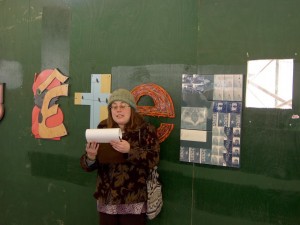 Jennifer Karmin has been collecting 4000 WORDS for the over 4000 DEAD Americans in Iraq. All words are being used to create a public poem. During street performances, she gives away these words to passing pedestrians. Submissions are ongoing as the Iraq War continues and the number of dead grows. Send 1-10 words with subject 4000 WORDS to jkarmin-at-yahoo.com
Jennifer Karmin has been collecting 4000 WORDS for the over 4000 DEAD Americans in Iraq. All words are being used to create a public poem. During street performances, she gives away these words to passing pedestrians. Submissions are ongoing as the Iraq War continues and the number of dead grows. Send 1-10 words with subject 4000 WORDS to jkarmin-at-yahoo.com
Alex Noriega – Stuff No-One Told Me

Check our more comic art by Noriega on his blog.
[thanks Gerry]
New Review Lit on the Block :: Reviews in Cultural Theory
Reviews in Cultural Theory is a journal of book reviews that responds to new developments in the theorization of culture. Published online bi-weekly and collected into issues three times a year, Reviews in Cultural Theory seeks to provide a forum to foreground both new work in this field and the emergent community of scholars who share an interest in the complex and changing problematic of culture today.
Focusing on the wide distribution of short and timely reviews and review essays, the journal aims to remain responsive to the dynamism and pace of this field. The journal’s first three issues chart the contemporary shape of cultural theory as it touches on Visual Culture, Gender Studies, Geography, Queer Theory, Marxism, Anthropology, Critical Race Theory, Postcolonial Studies, Cultural History, and Sound Studies, among other fields and subjects, established and emerging. We welcome suggestions of new work for review.
Editors: Imre Szemán, Sarah Blacker, Justin Sully
Modernist Literature and Economic Theory Project
The Modernist Literature and Economic Theory Project is being developed by Tudor Balinisteanu (PhD English Literature).
Project Description:
This project aims to connect modernist texts with economic concepts in transnational perspective. It responds to a need to reassess the contribution of literature to our interconnected forms of social and material life. Once fully developed, it will provide resources to scholars interested in exploring the connection between literature and economic materialism. On the one hand, the project invites reflection on literature as a market form itself; on the other it invites explorations of the ways in which literature engenders forms of social performativity and agency that contribute materially to society, and can therefore be studied in the framework of economic theory.
Contributions to the site are invited, and will be acknowledged on the page where they are placed.
Books :: Readings for Writers Now Available
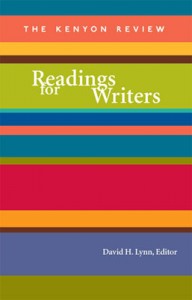 “Readings for Writers is a very different creature from your usual anthology. Yes, everything here has appeared in The Kenyon Review sometime during the past seventy years. That should establish literary merit, aside from the fame of many of the featured authors. But a different principle of selection comes into play: choosing stories, poems, and essays from across the decades to provoke lively responses from writers today, to inspire and challenge.” -David H. Lynn, Editor
“Readings for Writers is a very different creature from your usual anthology. Yes, everything here has appeared in The Kenyon Review sometime during the past seventy years. That should establish literary merit, aside from the fame of many of the featured authors. But a different principle of selection comes into play: choosing stories, poems, and essays from across the decades to provoke lively responses from writers today, to inspire and challenge.” -David H. Lynn, Editor
New LIt on the Block :: Pyrta
Janice Pariat, editor of the newly launched online publication Pyrta: A Journal of Poetry and Things, writes: Pyrta is a journal of poetry and other things based in Shillong, a small hill-station town in Meghalaya, India. It’s a little bit local, and mostly universal. Pyrta aims to be a vibrant multicultural space – we’d like voices from all over to contribute quality work categorised broadly under Poetry, Photo Essays, Prose, Sketches and Local morsels (somehow, we don’t like “tidbits”). We want to provide authors/photographers/artists, whether new or established, a platform to share what they love doing. We follow faithfully in the footsteps of Paul Valery who once said, ‘I can’t help it, I’m interested in everything.’ Hence submissions are welcome from anywhere. about anything.”
The first issue includes poetry bu Neel Chaudhuri, Trisha Bora, Nicholas Y.B. Wong, Kevin Simmonds, Sonia Sarkar, Robin Ngangom, Sharanya Manivannan, Piya Srinivasan, prose by Sajjawal Hayat and Samrat Choudhury, a photo essay by Shruti Singh, and sketches by Adam Pavitt & Stefan Ehrenfeld.
Published five times a year: Pyrem (Spring), Lyiur (Summer),
Por Slap (Monsoon), Synrai (Fall), Tlang (Winter), Pyrta is currently open for submissions for its next issue.
Indie Bookstores: Slash and Close
New or used, booksellers are struggling.
John King Books, an institution of used and rare books in Detroit, has slashed its prices in an effort to stay alive – “If we don’t move the entire inventory in a fairly quick time – a couple months – then I don’t know what I will do,” King said.
And another indie bookstore closes its doors – Second Story Books, NY. Such closures as this are no longer surprising news, and Peter Applebome of the NYT explores why.
Marie Alexander Poetry Series Open Submissions Period
The Marie Alexander Poetry Series has an open submission period during the month of July. An award of $500 and publication will be given for a chosen collection of prose poems by an American poet. Submit a manuscript of at least 48 pages, which can include some lineated pieces, along with a cover letter with complete contact information and an SASE for notification only. Postmark must be between July 1 and 31. Entries should also include a simultaneous electronic submission of the manuscript (MS Word or PDF format) sent to
Marie Alexander Poetry Series
Attention: Nickole Brown, Co-Editor
P.O. Box 5686
Louisville, KY 40255-0686
Books :: UDP Goes Digital Reissue
“Brooklyn indie poetry publisher Ugly Duckling Presse has turned to e-books as a means of re-issuing out-of-print poetry chapbooks, which has doubled readership for the books. The platform they’ve chosen — Issuu — has proven to be both robust and attractive, but also has complications in part because it is based on Flash.” Read more about the e-re-issue on Publishing Perspectives.
dislocate Contamination Issue & Contest Winners
dislocate #6 (Spring 2010) is themed “The Contaminated Issue.” Editors Colleen Coyne and J. Lee Morsell explain the Latin root of “contaminate” as tangere “to touch” – and the negative connotations and associations with the word. “But contamination has long held a secondary meaning: it is a blending that produces something new. In this increasingly interconnected, and increasingly mediated, world, that second definition becomes as important and the first.” Though I’m not so sure it will catch on in this more positive connotation, it certainly did attract a fair amount of subissions and contest entries for their Contaminated Essay Contest. The works of the winner, Lehua M. Taitano, and honorable mentions, Lehua M. Josh Garrett-Dvais, Katie Jean Shinkle, Nick Neely, and Brian Oliu, appear in this issue.
PPP the Place for Small Ventures
Started by Mathias Svalina and Zach Schomburg, Press Press Press is a “blog-shop for small poetry presses and journals” and features poetry, chapbooks, journals, and “things.” The are multiple contributors to the blog, and when I contacted Mathias to ask about how it works, he replied: “Ideally PPP should be viral. All members have administrative power & have been encouraged to invite whomever they think would be a good fit to be a part of it. Zach Schomburg & I started it as a place to be able to check in to find about about new releases from micro-presses. I don’t feel like we’re in charge of it, though. The only rules are that presses can only post the latest releases, no back catalog, & there should be no ‘bloggy’ posts.” Definitely worth a look and keeping an eye on.
Happy Anniversay & Good-Bye Pindeldyboz
“In celebration of the 10th anniversary of Pindeldyboz, we’ve made the decision to shut it down.” – Whitney Pastorek, Executive Editor
Literary Magazine Submissions – How Much Will You Pay?
Since the recent Tin House announcement asking readers (NOT requiring them to do so, mind you) to purchase a book from an independent bookseller (“Buy a Book, Save a Bookstore“) and use the receipt as their “ticket” to submitting work to the magazine as well as its contest, a slew of discussions have started about publications “charging” writers for submissions.
Brevity is asking its readers whether or not they should charge, and the nearly 300 responses run the spectrum of opinion on the matter.
The issue of charging for submissions is nothing new Narrative charges writers a “nominal” fee of $15-20 for all unsolicited submissions, and the The Missouri Review charges writers “a small fee” of $3 to submit their works electronically (I’m sure there are others, but this is who comes to mind at the moment). TMR Editor Speer Morgan in his discussion at this year’s AWP (Session 179 – The Future of the Literary Magazine) made no apologies for charging writers this fee (and they seem not to be lacking in submissions). He felt it offered at least some means of screening submissions and lessening the mass-submit phenomenon available to writers who use e-services (sending to as many publications as possible without familiarizing themselves with the publications content).
It also reminds writers that there is a cost to these literary endeavors – magazines are not staffed, printed, or able to maintain an online presence/e-mail submissions out of the kindness of this society’s heart – it takes cash, which the loss of several long-standing publications each year proves. I heard it’s “Robin Hood robbing the poor to pay the rich,” but I’m not sure I get that one, because anybody who think literary endeavors are rolling in it (esp. lit mags) is out of touch with reality (or needs to intern with a lit mag). I think it’s more like, “You have a nickel and I have a nickel, so let’s rub them together” – and hope we can keep this lit mag afloat another year.
Missouri Review also offers readers the option to send via traditional mail, which – remember – also costs money. Could not allowing submissions via electronic medium constitute a submission fee? I suppose you’ll have to take that one up with the post office (which will soon be raising those fee rates).
I don’t think this initiating act, which on the part of Tin House means encourage support for the literary community, should be the matter of contention. Sort of like playing Rock ‘Em Sock ‘Em Robots with yourself (“Yeah! I knocked my block off!”). “Just going through this list of independent bookstores,” NewPages Managing Editor Nicole Foor adds, “I can’t believe how many of them have closed.” Tin House is dead on with their effort. Buy books from indie bookstores and small presses, and buy/subscribe to literary magazines. Support the grassroots literary community – at their roots. That’s the point.
Still, this subsequent conversation – whether or not to charge cash fees for submission – is a good one and worth ongoing consideration. Michael A. FitzGerald (author of Radiant Days, co-founder of Submishmash) offers a more writer-focused perspective on this matter here: Reading Fees From a Writer’s Perspective.
CNF Virtual Yard Sale
Until July 26 Creative Nonfiction is having a virtual yard sale with: 10% off subscriptions; books up to 40% off; 80% off back issues; and $5 CNF mugs.
NewPages Lit Mag Review
Check out the latest great post of NewPages Literary Magazine Reviews, including both new and established publications in print and online – with a special thanks to all the reviewers who dedicate their time and energy to recognize these publications and writers:
Alaska Quarterly Review
The Asian American Literary Review
Blue Earth Review
Bombay Gin
Carpe Articulum
Fringe
Gargoyle
get born
Glimmer Train
Literal
Lumina
The New Quarterly
The Orange Coast Review
Oyez Review
Quiddity
Salmagundi
Sentence
Stone Canoe
West Wind Review
CLMP Classroom Lit Mag Adoption Program
Just in time for the new school year – the CLMP has started a new Lit Mag Adoption Program for Creative Writing Students program.
Overview
Most poetry, short fiction, and creative non-fiction by emerging writers first finds its way into print through literary magazines, yet few student writers actively engage with the spectrum of magazines published today. By integrating literary magazines into course curricula and providing opportunities for one-on-one interaction between literary magazine publishers and creative writing students (a key component of the program), the Lit Mag Adoption Program promotes a generation of new writers that are also active readers and productive members of the larger literary community.
How it Works
The Lit Mag Adoption Program for Creative Writing Students allows undergraduate and graduate creative writing professors to include literary magazines in their courses. Students receive discounted, 1-year subscriptions for selected literary magazines (professors receive a free “desk-copy” subscription). Each participating class will receive at least two issues of the magazine during the semester. In addition, classes will have direct interaction with the magazine publisher/editor through a virtual (or in-person where local) “One-on-One” chat session.
Professors: Register your class now. Once you have submitted the online registration, your desk copy order will be processed and you will receive unique login information to provide to your students. Students will then order their discounted subscriptions through this website.
Students: Order your course subscription now. Note that you will need the unique login information provided by your professor. NOTE: course adoption subscriptions can ONLY be ordered through the CLMP site – NOT on the magazine’s web site.
Participating Magazines
A Public Space
American Poetry Review
American Short Fiction
Antioch Review
Asia Literary Review
Beloit Poetry Journal
Colorado Review
Electric Literature (Digital Version)
Electric Literature (Print Version)
Iowa Review
Journal of Ordinary Thought
Kenyon Review
Literal
Midway
Missouri Review
New England Review
One Story
Ploughshares
Poetry Magazine
Priairie Schooner
RAIN TAXI
SALMAGUNDI
The Blotter
The Oxford American
TIFERET: A Journal of Spiritual Literature
Tin House
Tipton Poetry Journal
Verse Wisconsin
Virginia Quarterly Review
Waterways: Poetry in the Mainstream
ZYZZYVA
The CLMP site also includes several related essays:
Using Literary Magazines in the Classroom: What’s New? Community Building with Literary Magazines By Kimiko Hahn
Literary Magazines: Gateway to Publishing Now By David H. Lynn
Literary Magazines in Context: A Historical Perspective By Carolyn Kuebler
New Lit on the Block :: Stirfry
 Stirfry Literary Magazine was created by several members of the Young Writers’ Workshop of San Gabriel Valley and is currently edited by Alana Saltz [cover image shown], Cherisse, Carrie Rasak, Christina Young, and Henry Jacobs. Stirfry aims to showcase quality work from new,emerging, and established writers alike. The magazine also features original artwork and photography.
Stirfry Literary Magazine was created by several members of the Young Writers’ Workshop of San Gabriel Valley and is currently edited by Alana Saltz [cover image shown], Cherisse, Carrie Rasak, Christina Young, and Henry Jacobs. Stirfry aims to showcase quality work from new,emerging, and established writers alike. The magazine also features original artwork and photography.
Authors and artists featured in the first volume include Mark Barkawitz, Crystalee Calderwood, Jim Fuess , Stefanie Maclin, Lorena Madrigal, Jeffrey Miller, Juliana Mims, Dillon Mullenix, C. Nadal, Denise Pater, Alana Saltz, Linda Wolff, and Claire Zhang.
Stirfry is now accepting submissions for their second issue, deadline TBA. For priority consideration, submit as soon as possible. Please read all of their guidelines before submitting.
Listen Up!
You are invited to participate in the first World Listening Day, which happens on Sunday, July 18, 2010.
The purposes of World Listening Day are:
- to celebrate the practice of listening as it relates to the world around us, environmental awareness, and acoustic ecology;
- to raise awareness about issues related to the World Soundscape Project, World Listening Project, World Forum for Acoustic Ecology, and individual and group efforts to creatively explore phonography;
- and to design and implement educational initiatives which explore these concepts and practices.
World Listening Day is being organized by the World Listening Project, in partnership with other organizations. July 18 was chosen as the date for World Listening Day because it is the birthday of the Canadian composer R. Murray Schafer. Schafer is one of the founders of the Acoustic Ecology movement. The World Soundscape Project, which he directed, is an important organization which has inspired a lot of activity in this field, and his book Soundscape: The Tuning of the World helped to define many of the terms and background behind the acoustic ecology movement.
The World Listening Project invites you to participate in World Listening Day. Here are several possibilities—
- You can set aside some time when you pay attention to your soundscape.
- You can organize a soundwalk or a listening party when people play field recordings.
- You can organize a performance event that involves field recordings and other artistic expressions that explore our soundscape and how we can listen to our sonic environment.
- You can facilitate an educational event that relates to acoustic ecology, field recordings, or a similar topic.
- You can contact organizations or individuals that are listed as participating in World Listening Day, to see if you can get involved that way.
Visit The World Listening Project for more information.
Interview :: Vanessa Place
Dan Godston interviews Vanessa Place – poet, novelist, critic, editor, founder/editor of Les Figues Press. Godston talks with her about her influences, her novel La Medusa, the latest projects with Les Figues Press, and the lit scene in LA. (examiner.com – Detroit)
21 Reasons Why This Movie Sucks
Playwright/performer Prince Gomolvilas takes on the movie 21, starting with the question:
“What is the greatest piece of Asian-American literature of all time?”
And it’s not The Joy Luck Club or No-No Boy…
Faulkner House Books
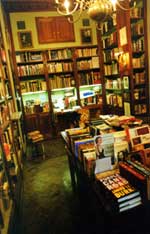 Opened 15 years ago in New Orleans French Quarter, the Faulkner House Books is located in a building where Faulkner rented rooms for a year in 1925 before leaving for France. In addition to William Faulkner, specialties include Tennessee Williams, Walker Percy, Modern First Editions, Southern Americana with an emphasis on New Orleans and Louisiana-related titles, and Johnsoniana. Special requests and search requests are also welcome.
Opened 15 years ago in New Orleans French Quarter, the Faulkner House Books is located in a building where Faulkner rented rooms for a year in 1925 before leaving for France. In addition to William Faulkner, specialties include Tennessee Williams, Walker Percy, Modern First Editions, Southern Americana with an emphasis on New Orleans and Louisiana-related titles, and Johnsoniana. Special requests and search requests are also welcome.
Got a cool, indie bookstore in your town? Be sure it’s on our Guide to Independent Booksellers. If you’re traveling, be sure to check the guide for stops along the way.
GAY Relaunch
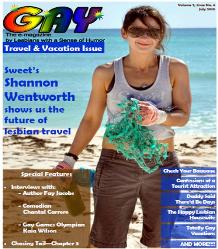 Founder/Editor-in-Chief of GAY e-magazine, Candy Parker invites readers and writers to this e-zine by lesbians with a sense of humor. “GAY‘s primary mission is to provide a publication forum for lesbian humorists. We also publish interview/profile features on lesbian comedians and others of interest to the community. In keeping with our theme, all interviews/profiles feature a humorous element of some sort. Humorous essays published in GAY are also accompanied by original artwork created by our all volunteer staff.”
Founder/Editor-in-Chief of GAY e-magazine, Candy Parker invites readers and writers to this e-zine by lesbians with a sense of humor. “GAY‘s primary mission is to provide a publication forum for lesbian humorists. We also publish interview/profile features on lesbian comedians and others of interest to the community. In keeping with our theme, all interviews/profiles feature a humorous element of some sort. Humorous essays published in GAY are also accompanied by original artwork created by our all volunteer staff.”
While GAY is a relatively new venture (re-launched on April 1, 2010), it has garnered some attention. Most recently, Parker was honored as one of GO Magazine’s “100 Women We Love Class of 2010” (June/July 2010 issue).
Survivor Chronicles Online
Survivor Chronicles is a small independent publication dedicated to trauma release, healing and survival. We are mostly a poetry magazine, but also invite short fiction/non fiction as we acknowledge the fact that many writers/artists are more comfortable expressing themselves through other styles.
We want to hear from you:
•If you have survived a major trauma, or are in the process of surviving it.
•If someone close to you has survived a major trauma or is in the process of surviving it.
•If you are a social worker or health worker or any other professional and have seen trauma at close range.
•If you are a writer or artist who deeply empathizes with the human condition and can portray trauma and its process and/or effects honestly and sensitively.
•If you are a photographer who has documented trauma and its survival.
Here are some general submission guidelines:
•We prefer shorter pieces to longer ones, owing to the attention span of the average internet reader.
•We love poetry, and occasionally well crafted short fiction, and are also interested in analytical opinion pieces (non fiction) and musings about trauma survival and its relationship with leading a meaningful life.
•In the body of an email, paste 1-5 poems, or short fiction/non fiction within 1500 words.
Artists and photographers can send 1-5 pieces for consideration; email •as separate attachments.
New Lit on the Block :: Tottenville Review
Tottenville Review is a collaborative of authors, reviewers, and translators, dedicated to finding and writing about new voices in literature. While open to reviewing and interviewing even the most established, their primary focus will be debut books, or books by relatively new authors, including works in translation published in the US for the first time.
The first issue includes interviews with Porochista Khakpour (Sons and Other Flammable Objects), Sa
